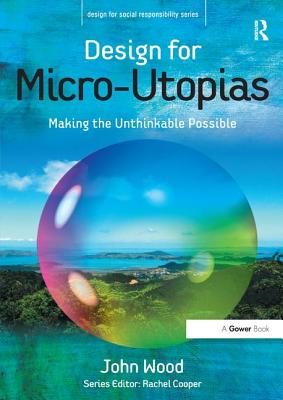
Design for Micro-Utopias: Making the Unthinkable Possible
Design for Micro-Utopias does not advocate a serious quest for a single, monolithic Utopia. Rather, it invites readers to embrace a more tentative, temporary, pluralized and truncated version of Thomas More's famous 1516 novel of the same name. It therefore encourages the proliferation of many 'micro-utopias' rather than one 'Utopia'.
| Quantity | Price | Discount |
|---|---|---|
| List Price | $59.95 |
Non-returnable discount pricing
$59.95
Book Information
| Publisher: | Routledge |
|---|---|
| Publish Date: | 09/09/2016 |
| Pages: | 226 |
| ISBN-13: | 9781138252424 |
| ISBN-10: | 1138252425 |
| Language: | English |
Full Description
Everyone is already painfully aware of our predicament - ecological extinctions, dwindling fossil fuel reserves and economic chaos. The solutions are less obvious, despite the many opportunities that surround us. We have never had more access to resources, knowledge and technology but this is not the problem. What we lack most is creative thinking, fuelled by collective optimism. In a pragmatic world run by careerist experts this is hardly surprising. As voters and consumers we are trained to choose and complain, but not how to envisage what we really, really want. How can we design a better world unless we revive the art of dreaming? For without dreams we are lost. Perhaps it should be the duty of all citizens to imagine alternative futures; in effect, to think more like designers. After all, designers have always been dreamers, and have often found ways to realize their dreams. Design for Micro-Utopias does not advocate a single, monolithic Utopia. Rather, it invites readers to embrace a more pluralized and mercurial version of Thomas More's famous 1516 novel of the same name. It therefore encourages the proliferation of many 'micro-utopias' rather than one 'Utopia'. This requires a less negative, critical and rational approach. Referencing a wide range of philosophical thinking from Aristotle to the present day, western and eastern spiritual ideals, and scientific, biological and systems theory, John Wood offers remedies for our excessively individualistic, mechanistic and disconnected thinking, and asks whether a metadesign approach might bring about a new mode of governance. This is a daring idea. Ultimately, he reminds us that if we believe that we will never be able to design miracles we make it more likely that this is so. The first step is to turn the 'impossible' into the 'thinkable'.




